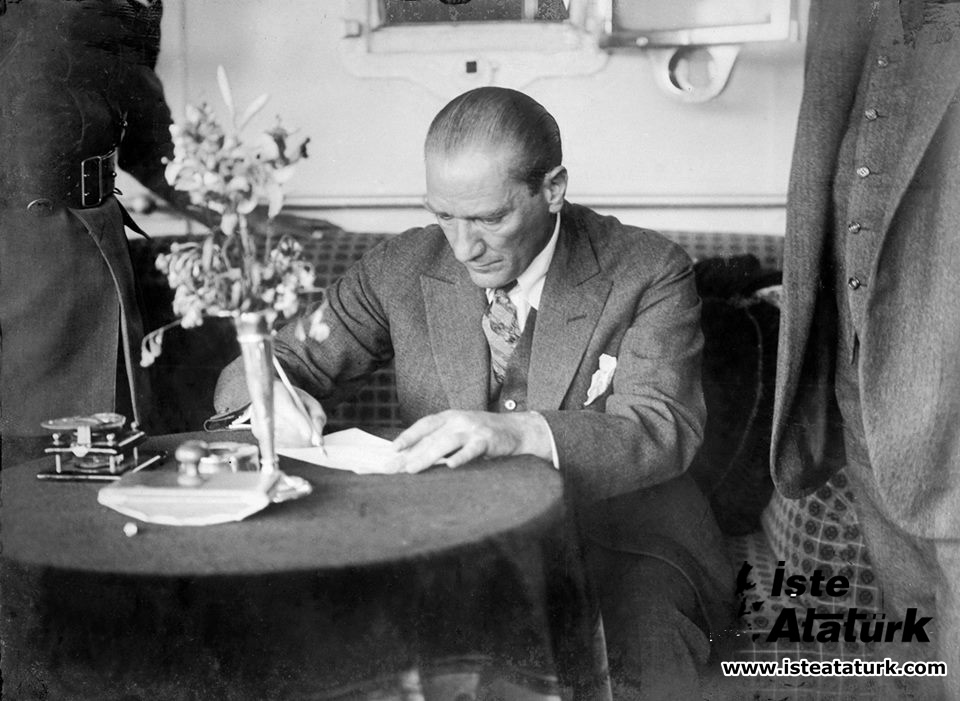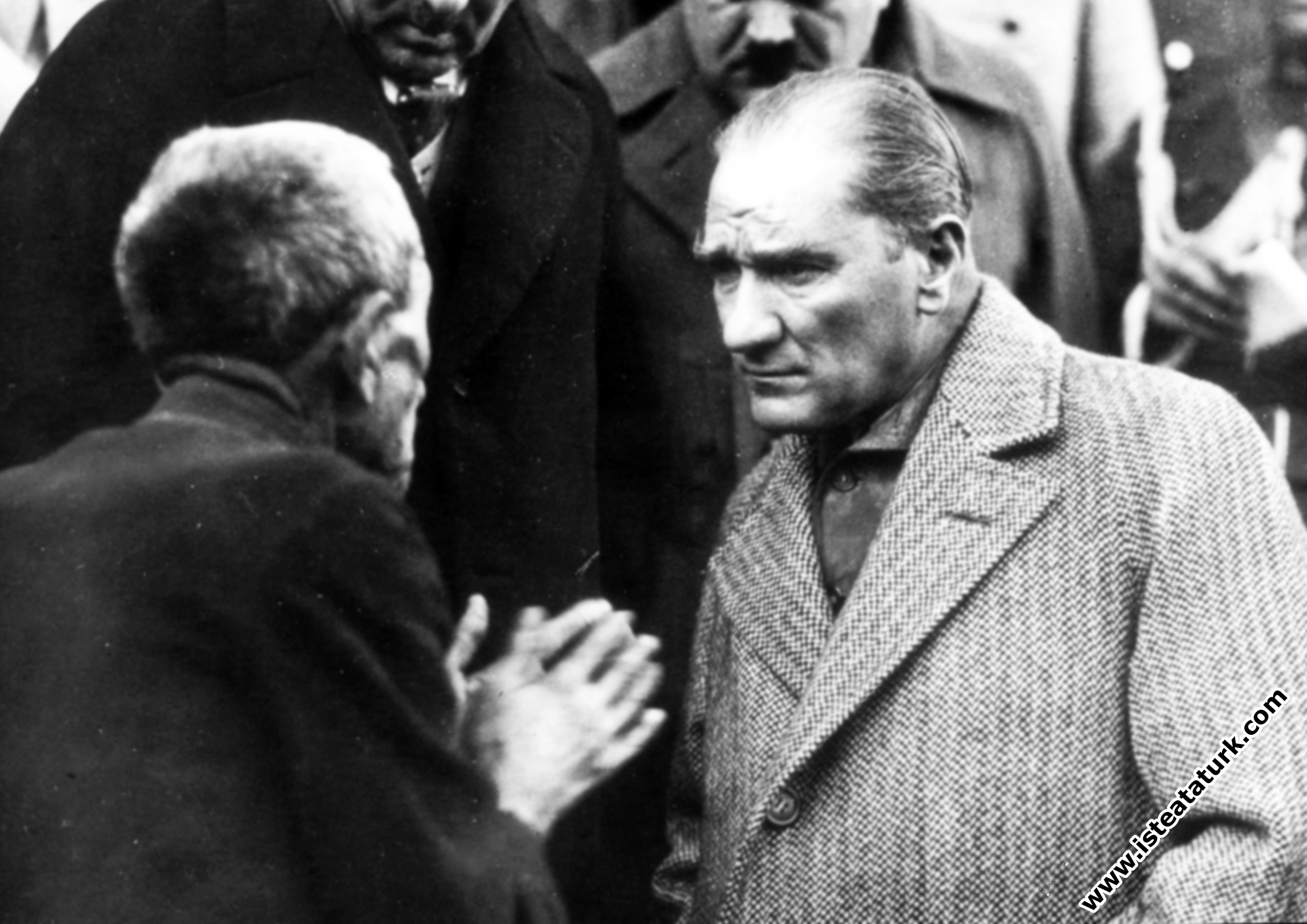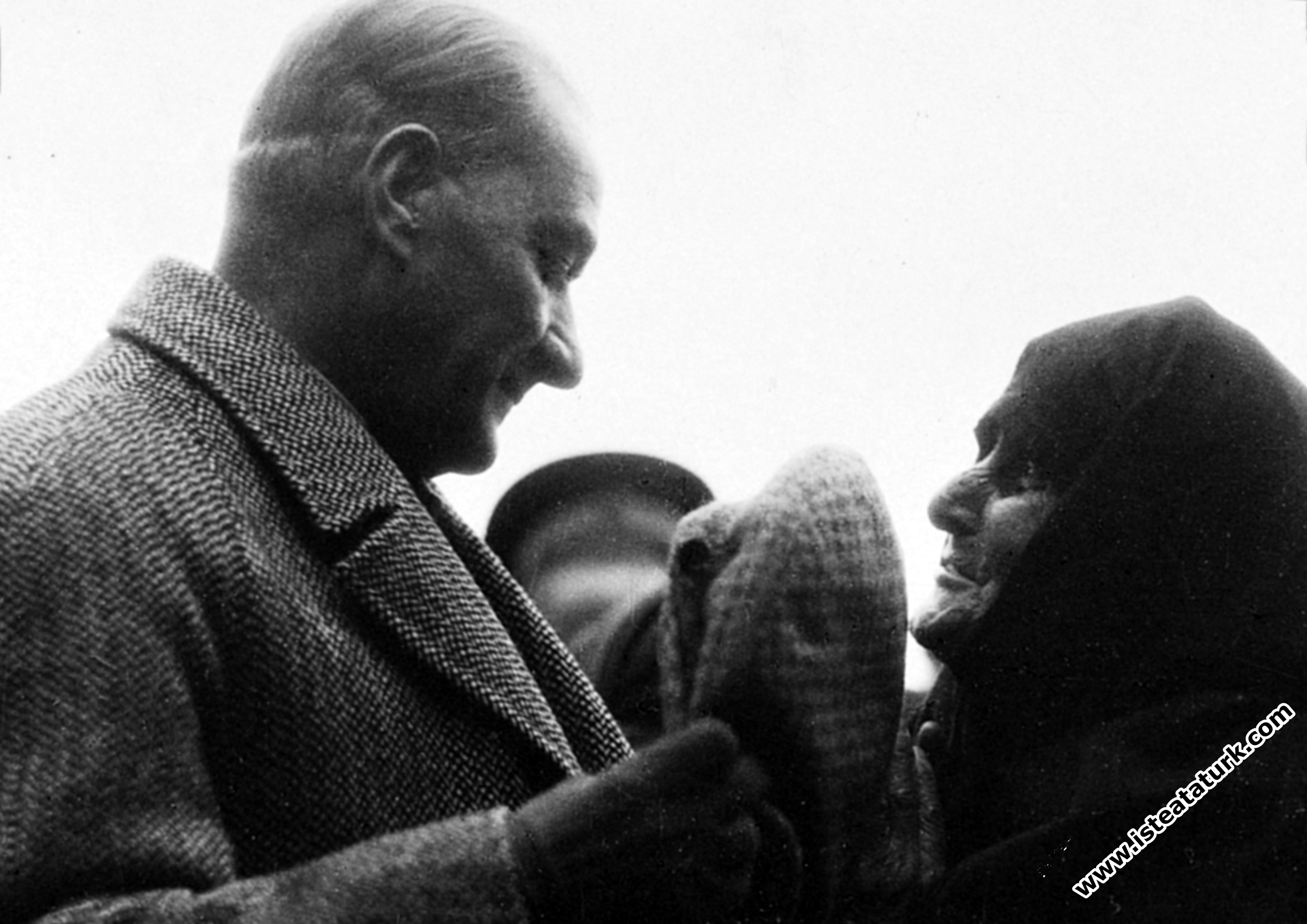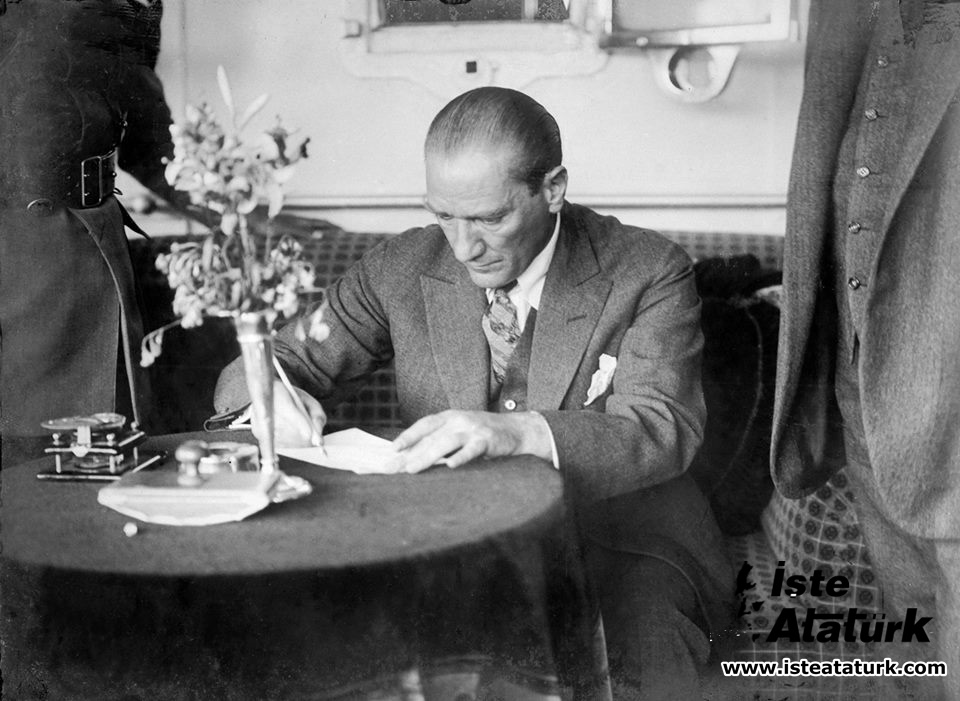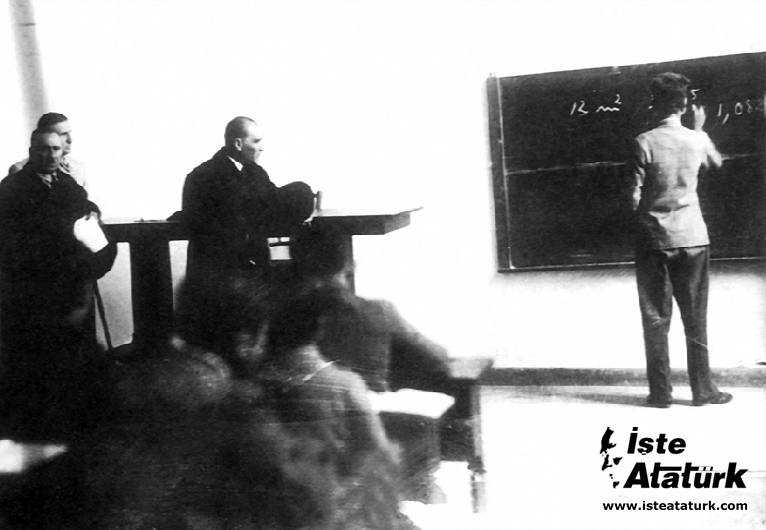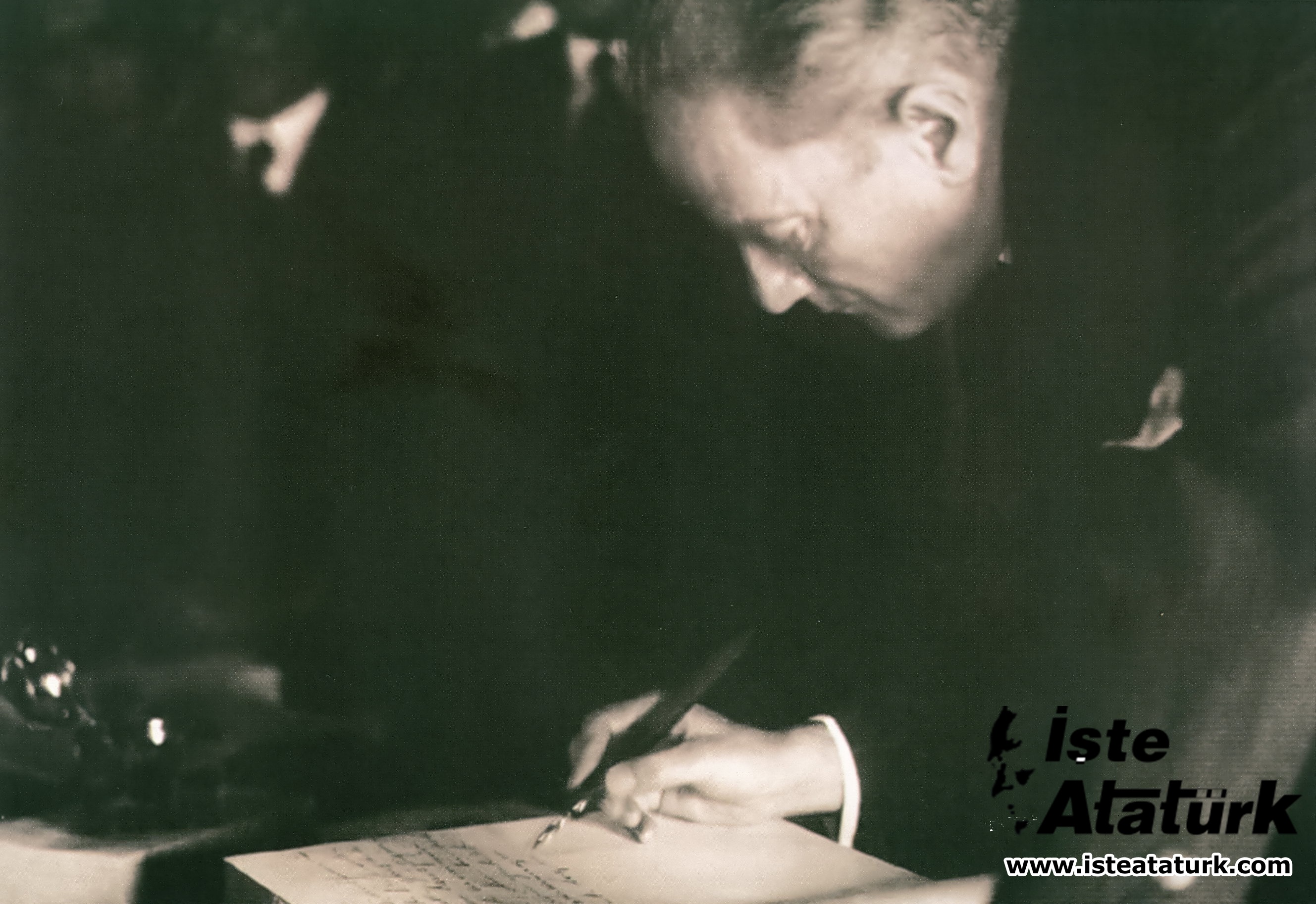
ASocial Structure Elements in Atatürk's Thought
Character Size
“It is our motto to act with reason, logic and intelligence. The cases that fill our whole lives are the proofs of this truth.” Mustafa Kemal Atatürk
SOCIAL STRUCTURE ELEMENTS IN ATATURK'S THOUGHT
Although Atatürk's views on society are much needed, they have not been studied much.
Before moving on to the elements of social structure in Atatürk's thought, I would like to make a few explanations about the concept of social structure.
The concept of social structure forms the basis of any sociological analysis. In structural analysis, relationships are seen as the basic units of social structure1.
According to some sociologists, social structure is used to mean a kind of social whole. This social whole can be at least conceptually divided into interconnected parts, and changes in some of these parts are accompanied by changes in others. In this sense, the structure is separated from the stack.
According to D. Lockwood, the social system is a system of actions and its structural features consist of the continuous interaction of individuals within the framework of common norms. The task of sociologists is to deal with the questions of which function feeds the social structure through dynamic processes, and what motivates individuals to comply with normative values in these processes2.
According to Merton, social and cultural structure consists of many elements. One of these elements is the ideas, goals, goals and interests that arise from cultural differences, and the other is the legitimate ways that culture determines to achieve these goals and objectives3.
Another view on social structure argues that social structure is based on norms that determine the roles required of certain people depending on their social status4.
In the field of social life, each of the thousands of large and small units reflects a social structure. All these totalities form the largest social structure, society5.
In the social structure, individuals are in a face-to-face and formal relationship with each other. Every social structure is the sum of these relationships.
Atatürk's understanding of people and society was reflected in all his practices while founding the new Turkey6.
The real potential required for Atatürk is human potential. For this reason, it gave importance to human and placed human relations, which are the cornerstones of social structure, at the foundation of development7.
Atatürk is of the opinion that unless the structure, thinking and legal order of the society change, no step can be taken on the path of civilization. He expresses this belief as follows; “The destruction of a nation means that it is weak, neglected and sick. For this, the real salvation is obtained by finding the disease in the social structure and seeking ways of healing, and only if the scientific way is followed, health is achieved”8.
As it is seen, Atatürk studied the structure of society very well and took rationality as the basic starting point and mandatory condition in all his thoughts and practices related to human and society. He systematically examined social events like a mathematician and acted objectively in all his applications.
Despite the strong charismatic elements in his authority, Atatürk did not want to take advantage of his charisma and tried to institutionalize his authority within rational-legal patterns from the beginning. Few charismatic leaders in history have succeeded in institutionalizing their authority.
Gene Rustow says in his article titled “Atatürk as Founder of the Institution”; “After all, Atatürk created a series of institutions that are organically built on the legacy of the past, respond effectively to the needs of the present, and protect his people against the threats of an uncertain future”9 (such as the TGNA Müdafaa-i Hukuk Teşkilâtı, Halk Fırkası).
Atatürk took his authority from the will of the nation. After Atatürk liberated the Turkish nation, he started the changes related to the social structure, which he studied very well and knew the problems of, by giving a new shape to the state10.
Because according to the value measure he uses, first the state comes, then the economy and then the social structure11.
According to Atatürk, the state is the product of social culture. “Each society creates a state structure as a requirement of its own culture.” By saying that the state must be strong, take its legitimacy from the people and be ahead of the society so that it can influence the society in this direction and take it further and better, it expresses that the state and society are in an interaction process, and a state that does not derive its source and power from the nation cannot be continuous and effective. In addition to these, in Atatürk's thought, the state and the nation should be integrated with each other. Only in this way can we talk about a strong state. Atatürk talks about the integration of all the elements of the social structure on every occasion.
Atatürk is not in favor of the separation of powers in the thought of the state. According to him, there is only one force, one will: the people. Everything originates from the people. The will of the people is indivisible and cannot be transferred to anyone else12. Atatürk kept this will alive in his own person.
Because Atatürk believes that the strong and permanent state will be based on two important foundations: 1 - Full independence 2 - National sovereignty. Of these two elements, national sovereignty ensures the continuity of the state.
In addition to these, he expresses how important the national unity is for the state structure with the following words: “Sirs, there is only one decision in the face of this situation. And that is to establish a new Turkish State unconditionally based on national sovereignty”13.
In fact, in a speech he made in Ankara on December 1, 1921, he said in a nutshell: “If it is necessary to express our government from the point of view of science and society, we say People's Government” 14.
In that case, statism is the basis of Atatürk's thought system, who had to create a modern and strong state.
In Atatürk's thought, statism does not mean the restriction of the freedom of private enterprise or the rejection of the market economy15. Because, while explaining the relationship between state and society, Atatürk did not take the state as a structure independent of the characteristics of the society, on the contrary, he saw the state and the members of society as complementary, not opposite to each other. He believes that in order to achieve a strong and contemporary economy, the state must intervene in various ways in economic life as a producer, investor, or as a producer, investor or encouraging and helping production and investment.
Knowing well the structure and functions of institutions in the social structure, Atatürk gives an important place to the economic institution, defines the State of Turkey as an economic state and resorts to the help of economy and science in the progress and strengthening of the state. He expresses his thoughts on this subject as follows: "No matter how great the political and military victories are, if they are not crowned with economic victories, the victories that occur are not permanent, they will fade in a short time." He emphasizes the important function of the economy in the development of society by saying “Economic development is the backbone of Turkey's ideal of a free, independent, always strong, and always more prosperous Turkey”16.
Another important concept in his thought system in relation to Atatürk's state view is the concept of populism. Atatürk has defended populism since the beginning of the National Struggle. This concept has been used not only in the sense of popular government, political democracy, but also to indicate the new social and economic order of Turkish society17.
Populism is a result of the idea of nationalism in Atatürk's thought and at the same time a socio-political justification for it. Thus, populism is a tool to ensure the unity of society around the ideals of nationalism18.
Atatürk ideally considered a model of political organization that would form from the public to the elite. Every stage of this organization takes place with the participation of the public19.
This understanding basically places great emphasis on social justice, social security, protection and empowerment of the economically weak sections of the society, and fair income distribution20.
As can be seen, Atatürk gives importance to the development of the society as a whole with all its sectors.
Populism is the government of the people, by the people, for the people. In populism, the political regime of the state is used by the people and for the benefit of the people. Because, in Atatürk's thought, all members of the society are equal without any privilege. No one, no family, no congregation has been granted privileges. The implementation of this principle is also guaranteed by the laws enacted. It can be seen that populism is identical with the concept of the Republic. Atatürk later switched to the concept of Democracy and attached great importance to the economy in this connection. Democracy will depend on the people. The administration belongs to the whole nation. Thus, in the Atatürk thought system, the Republic-Democracy-People form a whole in the form of a circle.
Another important issue in Atatürk's thought is the nation. Atatürk made a definition of the nation in accordance with contemporary ideas. In this definition, the factors that make up the Turkish nation are listed as follows:
1 - Unity in the political entity
2 - Language unity
3 - Dormitory union
4 - Unity of race and origin
5 - Historical karabet (proximity)
6 - Moral karabet (intimacy)21
According to this definition, the nation is “a political and social committee composed of citizens connected to each other by the unity of language, culture and ideals”22.
As it can be understood from this definition, a nation is a whole formed by people who, unlike the mass, are in a constant relationship for the same purposes.
People's coming together within the framework of their common characteristics and common goals and their desire to live together continuously is a situation that has existed since the first ages of history, it is a social event. In this way, people come together and experience a sense of sharing and solidarity arises among them.
If it is accepted that the last stage reached in the development of the society is the nation, the fact that the basic feature of the nation is social solidarity emerges. Because, as stated before, the individuals who make up the nation share the same ideal23. Atatürk emphasizes the national consciousness.
The nation is a historical, political, legal and social reality.
After making a definition as "a society composed of people from a culture is called a nation", Atatürk elaborates this definition as follows:
a) Having a rich commemorative heritage,
b) Being sincere with common desire and consent about living together,
c) And the society formed by the union of people who have a common will to continue the preservation of the heritage is called millet. If this definition is examined, the value, strength and freedom of conscience in the bonds of people constituting a nation will be understood automatically. Indeed, the common legacy of victory and loss from the past, the same program to be realized in the future, being happy together, having the same hopes together, of course, take on a meaning and scope in today's civilized mentality, above all other conditions24.
As it is clearly understood from the definition, social solidarity, unity of feeling, common past and common expectations from the future are especially emphasized. Social solidarity in society is the basis of integration.
According to Atatürk, national morality is an important element that holds the nation together and ensures solidarity, social welfare and order. Its source is the society, the nation. This morality can only be social and national above individual individuals. Atatürk explains these thoughts and concept as follows:
“The place of morality in the formation of a nation is very great and important.” Indeed, morality can only be social and national above and beyond private individuals.” “It is the national morality that demands attention, effort, self-renunciation and self-sacrifice when necessary, in order for the social order and tranquility of the nation, its prosperity, happiness, safety and security today and in the future to progress and rise in civilization”25.
With this sociological expression, the formation of the social self is the development of the collective consciousness, the sense of us.
While explaining the process of becoming a nation, Atatürk used two important concepts and explained their functions. One of them is national culture, and the other is the concept of 'sovereignty', which he frequently refers to when describing state negotiations.
The introduction of the concepts of national sovereignty and national will into political life was with the National Struggle. With the circular issued from Amasya, Atatürk declared the motto “the independence of the nation will be saved by the determination and decision of the nation again”.
The principle of national sovereignty formed the basis of the Turkish Grand National Assembly, which convened on April 23, 1920. Atatürk accepted sovereignty as the supreme power, a political power.
As can be seen, while defining the concept of sovereignty, he talked about national will and sovereignty and expressed the necessity of both being in the nation for a democratic society. This will and dominance should be used in the regulation of the state and the citizen to properly fulfill their duties towards each other.
Atatürk explains the national culture, which distinguishes one society from another and determines a special lifestyle, as another important element that makes up the nation.
He defines culture as: “It is a summary of what the human community can do in state life, intellectual life, that is, in science..., in fine arts, and in economic life.”
Another definition; “Culture is to read, to understand, to see, to make sense of what one can see, to take an impression, to think, to train the intelligence”26.
National culture, as such an important element, reinforces the process of becoming a nation. Cultural unity (if they share the same values, feelings, culture) ensures the strengthening and continuity of the social structure. Common cultural values play an integrating role27. Atatürk accepted culture and civilization as a process. Therefore, it has combined and integrated the two. This means modernization in sociology, so he talked about modern Turkey. It is an educational institution that has a very important place in Atatürk's thought in order for the new Turkish State to reach the desired level.
As it is known, rationalism and being scientific constituted Atatürk's basic philosophy of life. It is possible to exemplify this with the following words: “It is our motto to act with reason, logic and intelligence. The cases that fill our whole lives are the proofs of this truth”28.
Atatürk, who placed the educational regulations at the starting point of his studies on social welfare and country development, saw the necessity of eliminating the ignorance of the people first of all, and accepted that we could reach the level of modern civilization only by raising the level of education. Because according to him, it is science and technique that will guide us. In fact, the basis of this is culture, as in Atatürk. Prosperity is a culture.
Atatürk realized the necessity of science and technology, which are two essential elements for social development today, and worked for their development.
In addition, the fact that he talks about the necessity of transforming knowledge from being purely theoretical to applying it in socio-economic life proves once again how far-sighted he is. According to WG Simmel, one of the contemporary sociologists, being educated helps one to govern oneself better, otherwise it will not help us how to be governed by others.
In the field of education, Atatürk behaves equally as in his practices in other fields and states that the whole society should be educated.
It was natural for Atatürk to attach great importance to education, believing that development can only be achieved under the leadership of reason and science.
“There are forces that make a nation a nation, advance and raise it: Intellectual forces and social forces... If ideas are filled with meaningless, illogical and empty words, those ideas are sick. Likewise, social life is paralyzed if it is full of useless and harmful beliefs and traditions that are far from reason and logic.
First of all, it is necessary to start the work without purifying the resources of intellectual and social forces. Patriotism, pure-heartedness and self-sacrifice are essential characteristics for those who want to save their country and nation. However, in order to see the disease in a society, to treat it, and to advance the society according to the requirements of the century, science and technique are necessary in addition to these features. The activity center of enterprises related to science and technology is the school. For this reason, a school is necessary... The school teaches young minds to respect humanity, love for the nation and country, honor and independence. When independence is in danger, it tells the best way to save it...”29 and explains the positive effects of education on the youth and the society through them.
For Atatürk, who said, “Science and technique will be our guide in the political and social life of our nation and in the intellectual upbringing of our nation,” change is inevitable in every field. Our social life will also change over time. To be successful in social and economic life, it is necessary to learn and apply innovations in order to advance in science and technology.
Atatürk, who stipulates the leadership of science and science in political and social life, emphasizes the importance of education and states that all members of the society should be educated with women, men, children, peasants and workers, and stating that the socialization process starts from the family, the education of the mother, who has a very important place in the child's first education, In fact, he frequently emphasizes that it is a necessity for women to be more prosperous and more knowledgeable than men for raising an enlightened generation, and it makes educational arrangements in line with these goals. Because Atatürk regarded the family as the basic institution in the society, and the woman who played an important role in the transfer of cultural values from generation to generation in the family and gave the child's basic education as the basic element and gave her rights in every field.
Atatürk has repeated on every occasion that he is against gender discrimination in every field. He explains this view very well: “If a society is content with the acquisition of new necessities by only one of its kind, that society will be very weak on the other hand... If science and technology are necessary for our society, both men and women must acquire them equally.
From this point of view, I would like to move on to the place and importance of the concept of division of labor in Atatürk's thought, which Atatürk considers very important for the continuity of the social structure and the general welfare and order of the society.
The necessity of social organization and division of labor for social structure has been known since the early times when people started to live together. This issue is clearly seen in Atatürk's social thought. Atatürk saw how important the social organization is for the continuity of the social structure and social order and clearly stated the place and importance of the division of labor in the development of society. He even stated that the division of labor is necessary not only in material affairs, but also in scientific, administrative and political affairs, that different branches of science have emerged, and that the scientist specializes in certain branches in the face of the impossibility of comprehending all of science.
“If people work individually, they cannot be successful. Because when God created humans, He gave them such a need that every human being is obliged and condemned to work with their fellow humans. When this activity of participation is almost a divine need, we easily understand how it is a necessity to combine purposes”30.
“The division of labor has added many new strong ties to the existing natural and historical ties between people. These new ties are the ones that make up for each other's deficiencies and try to ensure not only today but also tomorrow”31. His words clearly show that division of labor and organization is a reality that exists at every stage of society.
While explaining his views on the division of labor, Atatürk wanted not to discriminate between the sexes, and emphasized the need for each member of the society to do their part in solidarity in the best possible way for social welfare and development. He made an organismic analogy by saying that every part of the society, even "every organ" in his own words, should be active, otherwise that society would be paralyzed, and he stated the importance of the social function of each part. “All men are descendants of one social body and are therefore interdependent”32.
This view is the main theme in the organismic approach, the foundations of which were laid with A. Comte and H. Spencer, and in approaches that became clear with Durkheim and shaped as structural functionalism in today's contemporary theories. According to this, each part of the society is an organism that functions separately but in interaction with the other parts, and when there is a change in the structure, function and process of one of the parts, it is an organism that can create a change in the whole society from the other parts and through them. According to this organismic view, society is also based on the principle of 'division of labor', which has been considered as a necessary element for social order since Plato and Aristotle, which was defined clearly and in detail with Durkheim.
Sociologist Talcott Parsons, one of the important representatives of the naturalist type of structural functionalism, which is one of the three basic approaches among contemporary theories, emphasized the importance of institutionalized interaction, which is limited by culture and assimilated by personality, within stable patterns called social system, while explaining the social system. There are also at least two functional imperatives for integration within the social system on the one hand, and between the social system and cultural patterns, on the other hand, between the social system and the personality system:
1) A social system must have a sufficient number of actors acting in harmony as part of its role,
2) The social system must refrain from committing to cultural patterns that do not define part of the order or make impossible demands on people, thereby leading to deviation and conflict.
These ideas are very similar to Atatürk's views on social structure and social integration. Most of Parsons's explanations of social structure, function and integration in the 1950s were systematically made by Atatürk in the 1920s, 30 years before Parsons.
Social change-integration issues, which are the focus of attention of contemporary social theories, attracted Atatürk's attention at that time and he thought about how to achieve integration, what should be done for the continuity of the structure, and took the necessary precautions. He shed light on how the national movement will be organized and how the leader-people relationship will be ensured for the continuity of the existing social structure, and he clearly expressed this with the following words:
“If we look at the other details of the organization, we start with the village, the neighborhood and the people of the neighborhood, that is, the individual. Unless individuals are thinkers and realize their rights, masses can be directed to the desired direction, to good or bad directions by everyone. In order to save himself, each individual must be personally involved with his destiny. Of course, such an institution that rises from the bottom up, from the foundation to the roof will be solid. There is no doubt that at the beginning of every business, it must be top-down rather than bottom-up. If the first were realized, the whole of humanity would have reached its goal. Since there is no practical or financial possibility to do so, some entrepreneurs are helping to chart the direction that should be given to the nations. In this way, an organization can be established from the top down. In our travels in our country, we have seen with gratitude the perfection of our national organization, which had undoubtedly started in the first style, descended to the real source, and the real organization started from there again upwards. However, we cannot claim that it has reached the level of maturity”33. As it is well understood from his words, Atatürk, like a sociologist, made a very systematic analysis of society. As it is known, social change is an inevitable phenomenon in every social structure from simple to complex. So, how can reorganization and integration be achieved as a result of change? If not, what social problems will arise? However, we cannot claim that it has reached the level of maturity”33. As it is well understood from his words, Atatürk, like a sociologist, made a very systematic analysis of society. As it is known, social change is an inevitable phenomenon in every social structure from simple to complex. So, how can reorganization and integration be achieved as a result of change? If not, what social problems will arise? However, we cannot claim that it has reached the level of maturity”33. As it is well understood from his words, Atatürk, like a sociologist, made a very systematic analysis of society. As it is known, social change is an inevitable phenomenon in every social structure from simple to complex. So, how can reorganization and integration be achieved as a result of change? If not, what social problems will arise?
The balance of social structures is achieved with the help of various processes and mechanisms. Their failure results in varying degrees of imbalance and integration disorders34.
As it is known, Atatürk placed education, division of labor and culture, together with other elements, on the basis of the elements that ensure social integration. As we mentioned while explaining his thoughts on education, Atatürk emphasized the necessity of educating every member of the society and even stated that the aim should be to raise the people to the level of the intellectuals instead of lowering the intellectuals to the level of the people. In fact, I would like to emphasize once again that he wanted the women who had the greatest share in the transfer of the cultural elements that occupy the most important status in the socialization process from generation to generation, to be educated very well.
In Atatürk's system of thought, culture and especially its symbolic element such as language is another factor that ensures social integration. It is possible to come across a different opinion in Parsons. According to Parsons, communication and interaction would not be possible without symbolic resources. Thus, it is a culture that provides general resources to all individuals, providing interaction and thus facilitating integration. Another effect of culture on interaction is through values, beliefs, ideas, and ideologies within cultural patterns. These give the individual a common definition of the situation, as WIThomas says. In summary, Atatürk accepted the fact that society consists of people who share a common culture and a common life, and worked in parallel with this.
It is clear that Atatürk gave importance to education, economy, science and technology and leadership, which are considered important among the factors of social change, and based his studies on these factors.
Atatürk is very closely related to general welfare and order, as we have mentioned before. He frequently emphasized in his words and practices how important mutual tolerance is for social peace and order among the individuals who make up the society. According to him, "the existence of different ideas and opinions in society is natural, the important thing is that these different ideas and views come together in an environment of tolerance, in line with the common goals and interests of the society, without holding grudges and hatred towards one another"35.
As a result, Atatürk's idea of social structure presents an integrity from the people to the state. Economy, education, culture, family and institutions are of great importance in ensuring the integrity of the building. And this social integrity is based on the will and domination of the people unconditionally. Social development depends on the division of labor and solidarity between groups. As it is seen, there is no gap in Atatürk's thought, all his ideas and practices systematically present a unity.
I would like to end my speech with Atatürk's definition of two societies, which explains the main reasons for people to live together from the first period and defines modern society very well.
"It is society that protects us and keeps us living in prosperity. For this reason, it is necessary to give importance to society, strengthen it and keep it alive. For this, society is the source of all kinds of development, peace and security."36
"People should know that they were created with the natural share of living alone and absolutely in groups, from the time before they took the title of human on earth until today. That's why we all say, we can all be honored, we can all attribute this honor to ourselves, but the truth is that every individual honor and Dignity and heroism are not of any individual, but of the society made up of all these individuals.
NOTE: This conference was given on December 28, 1990 as part of the "Atatürk Conferences" series organized by the Atatürk Research Center.
1 Barry Wellman and SD Berkowitz ed. Structures, A Network Approach, University of Cambridge Press, New York 1988, p.15.
2 David Lockwood, System, Change and Conflict, ed. Demerath and Peterson, The Free Press, New York 1967, p.283.
3 Robert K. Merton, Social Theory and Social Structure, The Free Press, New York, 957. S.I32-I33.
4 George Lundberg, C. Schrag and N. Larsen Translated by: Özer Ozankaya, Sociology, vol: I, Işın Yay., Ankara 1970, p.166.
5 Nihat Nirun, Sociology, Book II, Yaykur Pub., Ankara 1977, p.108.
6 Gürbüz D. Tüfekçi, Atatürk's Thought Structure, Aydın Printing, Ankara 1981, p.20.
7 İsmet Bozdağ, From Atatürk's Universal Dimension, Ministry of Culture and Tourism, Publication, Sevinç Press, Ankara 1988, p. 126.
8 Bedia Akarsu, Ataturk's Revolution and Comments, Turkish Language Association Pub., Ankara University Press, Ankara 1969, p. 12.
9 Ahmet Mumcu, Ergun Özbudun and others, Atatürk's tics and Revolution History II- Kemalism (Basics of Atatürkist Thought System), Higher Education Council Pub., Ankara 1986, p.83.
10 Bedia Akarsu, supra, p. 14.
11 İsmet Bozdag, supra, p. 128.
12 İsmet Bozdağ, supra, p.40.
13 Ahmet Mumcu, supra, p.19.
14 Hamza Eroğlu, History of Turkish Revolution, War Spring., Ankara 1990, p. 420.
15 Ergun Özbudun, supra, p.69.
16 Ergun Özbudun, supra, p.69.
17 Ergun Özbudun, supra, p.64.
18 Hamza Eroğlu, supra, p.420.
19 Ergun Özbudun, supra, p.85.
20 Ergun Özbudun, supra, p.66.
21 Yusuf Sarınay, Atatürk's Understanding of Nation and Nationalism, Turkish Culture Research Institute, Ankara 1990, pp.5-8.
22 Hamza Eroglu, supra, p.391.
23 Hamza Eroğlu, supra, p.389.
24 Ergun Özbudun, supra, pp.47-48.
25 Ergun Özbudun, supra, p.49.
26 Ahmet Mumcu, supra, p.24.
27 Yusuf Sarinay, supra, p.61.
28 Hamza Eroglu, supra, p.487.
29 Utkan Kocaturk, Ataturk's Ideas and Thoughts, Olgac Matb., Ankara 1984, p. 102.
30 Utkan Kocaturk, supra, p.339.
31 Utkan Kocaturk, supra, p.339.
32 Utkan Kocaturk, supra, p.206.
33 Ergun Özbudun, supra, p.84.
34 David Lockwood, supra, 5,283.
35 Utkan Kocaturk, supra, p.207.
36 Utkan Kocaturk, supra, p.204.
37 Utkan Kocaturk, supra, p.204.
Prof. Dr. Tülin Günşen İçli
Source: ATATÜRK ARAŞTIRMA MERKEZİ DERGİSİ, Sayı 20, Cilt: VII, Mart 1991
